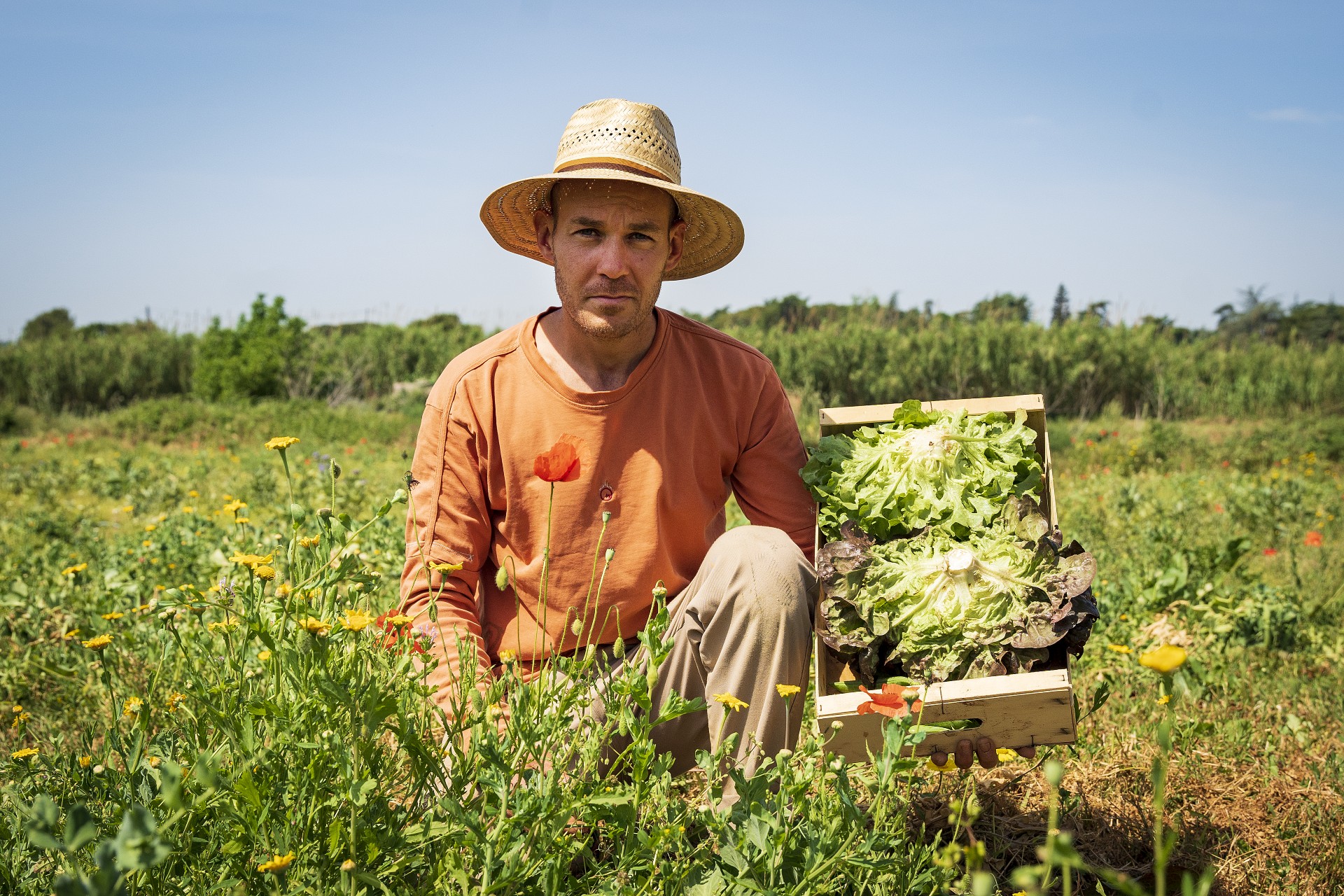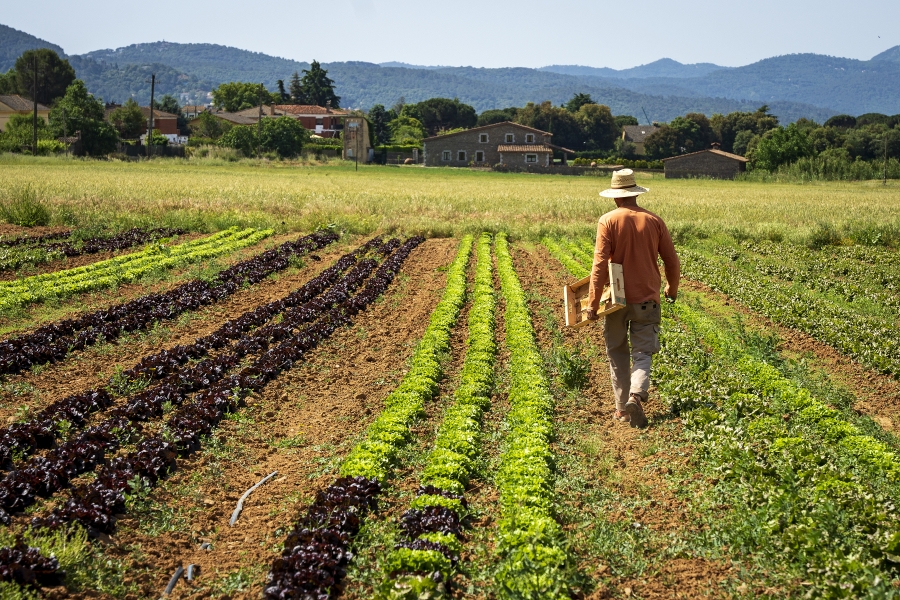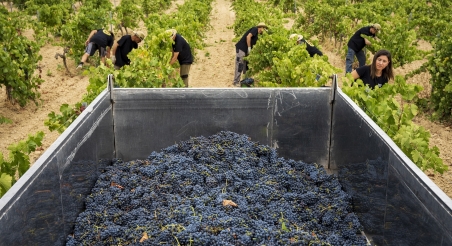In the foothills of Montseny, surrounded by sedges, reeds, and brambles, we find a very special organic vegetable garden. The farm is called Cal Cerdà, and the people who work there love the land with open hearts: in times of frost, they treat the celery plants as if they were their own children and wrap them in blankets to protect them from the cold.
One of these unique people is the agricultural engineer Marçal Parera. Born in Cardedeu 36 years ago, Marçal has managed to transform a traditional cereal farm in Sant Antoni de Vilamajor into a benchmark for organic agriculture in Vallès Oriental. Since he started this adventure with his friends Marc Marín and Quim Puigagut in 2012, he has never considered producing conventionally. Respect for the environment and the right of people to eat 100% healthy food are two of the principles that guide his way of understanding the cultivation of the vegetable garden, and, for consistency with these values, the four hectares he looks after near Cardedeu could only work ecologically.
We introduce you to a young and entrepreneurial farmer who lives in and for the territory. Touring the fields of Cal Cerdà with him is a pleasure that activates the legs, the head and, above all, the soul.
One of the main objectives of the European Union's 'From the Farm to Fork' strategy is to ensure that 25% of the agricultural land in the member states is cultivated according to organic criteria before 2030. At Cal Cerdà it has been eight years since you have the seal of the CCPAE, the highest regulatory body in Catalonia for organic agricultural production. What exactly do you do to ensure that your farming practices have a positive impact on the environment, rather than a negative one? How do you fertilize the soil, regenerate it and protect it from erosion?
To begin with, we have divided the farm into different sectors and so we can alternate crops and do rotations, which is very good for us to control pests and diseases and also to improve the fertility of the soil. In this sense, we are particularly proud of making our own compost, which we produce based on garden waste, chicken manure from La Tavella (an organic farm located 5 kilometers away, in Cànoves) and wood waste provided by our neighbors, producers of organic mushrooms called El Bolet Ben Fet. With this compost we give life to the whole farm.
Do you include fallow practice in your crop rotation system? Or is it unnecessary to let the field rest for it to recover?
No, in Cal Cerdà we don't do it, fallow. To take care of the earth, we use a much better technique: the sowing of green manures. In the sectors of the farm where we do not plan to cultivate for a while, we plant some variety of plant that covers the ground and prevents the soil from degrading. Once the plant has matured, we cut it, dig it up and bury it in the same place where we planted it, so that we are promoting the fertility of the soil thanks to the incorporation of this organic matter. Depending on the needs of the land, one or another variety can be planted, but usually cereals or legumes are used.
"In Cal Cerdà we don't do it, fallow. To take care of the earth, we use a much better technique: the sowing of green manures» Marçal Parera
At the level of chemical pesticides, the European Union wants their use to be reduced by 50%. How do you approach this challenge at Cal Cerdà?
Here we already have our homework more than done, since synthetic chemicals cannot be used in organic farming: neither fungicides, herbicides, nor pesticides. In fact, we use very few phytosanitary products and the ones we use are certified and non-residual, so they do not pose any problem for the environment. At Cal Cerdà we think that the best way to control weeds, pests and diseases is to be very attentive and get ahead of the game. For example, if it's raining now, we already know which crops are most sensitive to humidity and we do the best treatment to protect them. Another way to anticipate problems is to create attractive habitats for auxiliary fauna. In this specific area, we try to encourage the growth of flowers that are more attractive to certain insects. Their presence is essential, because they help us eliminate specific pests.
According to the latest report on the State of Nature in Catalonia, we are suffering a significant decline in the biodiversity associated with agricultural areas. The causes are multiple and complex, but how does a project like yours address this issue? Do you think that biodiverse farms can also be productive?
Of couse! As I mentioned before, we don't monoculture: the foods we grow vary greatly throughout the year and, with them, the insects that help us control pests vary. In addition, we have installed nest boxes to attract robins and other insectivorous birds. We also don't touch the edges of brambles, because we know that the passerines make their nest there. And, aside from the vegetal margins, the farm has many different spaces where the animals can live and hide: we have a pond, a reed bed, ingots, stacked stones, etc. In the organic vegetable garden, the auxiliary fauna is an essential ally.
"In the organic garden, the auxiliary fauna is an essential ally" Marçal Parera
On your farm, you grow many local horticultural varieties. What advantages do you see?
Yes, we love bringing to life seeds that our ancestors have been selecting over many generations. And we also really like to buy seeds from Les Rafardes, a cooperative that works to encourage the exchange of organic local varieties. When it comes to seedlings, we buy from the local nurseryman, who knows a lot and always gives us good advice on the varieties that can work best for us. We believe that by growing hook peas and beans, Tugas beans, mountain black turnips and toad skin cabbages we are enriching the territory with products that have an incredible flavor.
The maximum use of resources is a subject of great concern in Europe. How do you manage water in Cal Cerdà? Do you use it rationally and sustainably?
We water from wells and we do it with drip tape. It is a system that allows us to do a very localized and efficient irrigation, since it throws water right where the plant needs it and does not waste it. But we are also very concerned about the sustainability of the other resources and materials we need to carry out agricultural activity. For example, whatever we need, we always try to get it in our nearest surroundings and avoid buying it far from home. Common sense invites us to work locally, avoiding unnecessary travel.
From a sustainability point of view, reducing food waste is as important as saving water or other resources. What do you do at Cal Cerdà to improve the preservation of the food you produce?
We have a refrigerator that helps us keep food that needs it cold. But, in this particular aspect, we think it is very important to sell the freshly harvested products. In short marketing chains, food is less likely to spoil and lasts much longer.
"To reduce waste, we think it is very important to sell freshly harvested products. In short marketing chains, food has less risk of spoilage and lasts much longer» Marçal Parera
Specifically, where do you sell your products?
We have always sold our products with proximity criteria. In the beginning, when we had little production, we limited ourselves to handing out baskets and serving to some local restaurants and shops. A couple of years later, we started selling to Ecocentral (a distributor of organic food to school canteens), Ecomaresme (a cooperative that brings together producers of organic vegetables from Vallès, Maresme and Barcelonès Nord) and, on occasion , to other producers. When the Cardedeu agro-ecological market started, we joined it and we are there every Saturday morning. And very soon we will have our own stall in the municipal market, so we are happy.
And the store you have on the internet, is it working well for you? Have you noticed an increase in sales during the COVID-19 pandemic?
Of course! Before the confinement, we only served homes in Cardedeu, Llinars, Sant Antoni, Cànoves, Sant Pere and the adjoining housing estates, but we have recently partnered with a transport company and can now send baskets and product orders to Barcelona.
The 'From Farm to Fork' strategy highlights the importance of having a marketing plan that helps develop more sustainable and resilient food systems. At Cal Cerdà, you work on this topic very well: you take care of your website and you have very active social networks. Do you think it's worth spending time and resources on?
Totally, and you see, I was reluctant at first. But Marc, one of Cal Cerdà's three partners, was always very clear about it and we decided to bet on it. Many people contact us because they have seen our website or our Instagram, and in the end you realize that, on the internet, you have to be there, even if you don't like it. And what's more, you have to do it right, because it's your shop window and you have to take good care of it if you want to make yourself known and for people to enjoy the food you produce.
"On the internet, you have to be there, even if you don't like it. And, in addition, you have to do it well, because it is your shop window and you have to take good care of it if you want to make yourself known and for people to enjoy the food you produce» Marçal Parera
How can public administrations help projects like yours? Do you need data, legislation, grants, advice, training, etc., to improve the sustainability of your farms and make agriculture that is better for people, animals and the environment?
Honestly, what we lack the most are subsidies, since many of us have started the activity based on credits and, if we want to keep moving forward, we need financial help: in our case, for example, having money to buy plates solar would suit us very well. Advisory services are also key and, in fact, at Cal Cerdà we are very grateful for the support we receive fortnightly from the Cardedeu CSETC. And, at the level of legislation, it would be great if canteens in schools, hospitals, institutions and companies were obliged by regulations to buy local organic products.
Did you have to give up a lot to get here? Have you ever considered making a life change?
Carrying out a project like ours requires many sacrifices. Especially in the beginning, we were paid a pittance and worked like crazy, and if we put up with it, it's only because we love the work. Personally, I don't know how to live without being in the countryside. And I think that if I didn't have this passion for the land, I would have burned out a long time ago, because the work is very rewarding when you harvest a lot and sell everything, but the bad weather can make you suffer very hard.
The impact of climate change on agriculture is of great concern to the European Union. Do you have access to research and training on crop adaptation issues?
At Cal Cerdà we are very curious people and we are always on the lookout for new studies. But, in addition, we are lucky to be part of the Bages Plant Defense Association and every fortnight we are visited by a technician who advises us on aspects related to soil fertility, pest management, available innovations, etc. This entity is our main link with the academic world.
How do you see the future of Cal Cerdà?
With great uncertainty. We have always been very fair financially, but we can already see that we will have to compete more and more against large organic product companies. This competition will not be possible at the price level, because the margins we have as small producers do not allow us to do so. So we have to associate with other producers, specialize in specific foods, exchange them and network: if we want to fight the war on our own, we are lost. But it is also very important that we get closer to consumers, that they get to know us personally and see that we are local projects led by real people. Unlike big companies, we are authentic, we are rooted in the territory and people can come and see us whenever they want. The fact of being able to check first hand how the vegetables you eat are produced is a guarantee of quality and an option that the multinationals do not offer.
— BCN Smart Rural Editorial —




